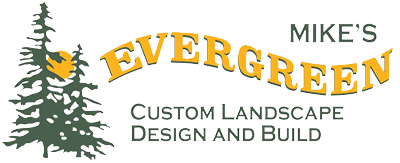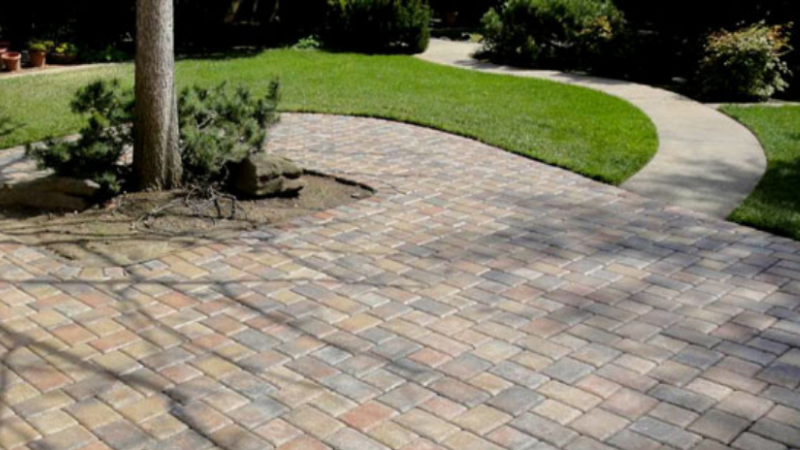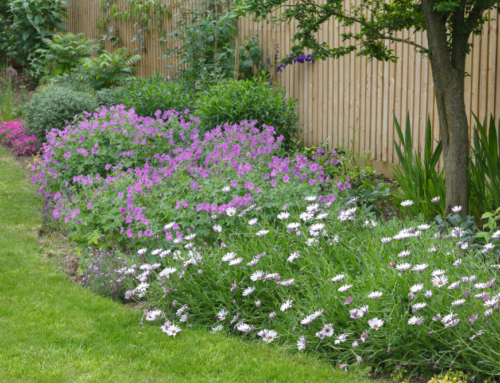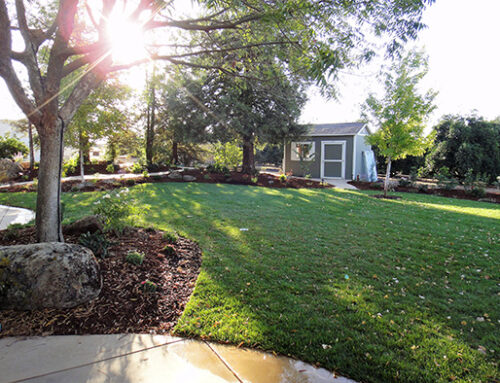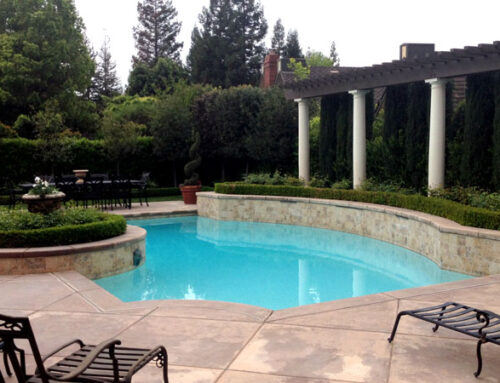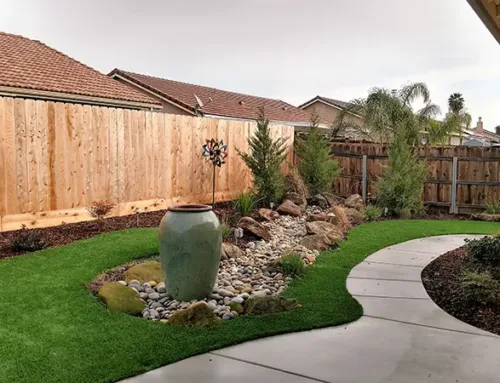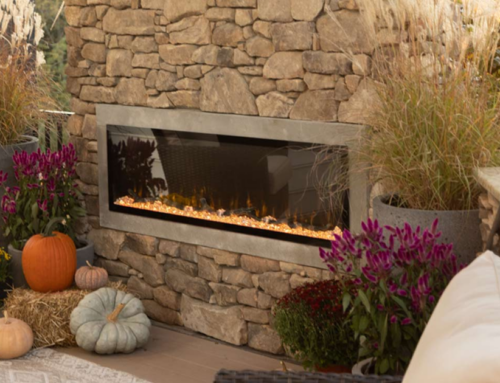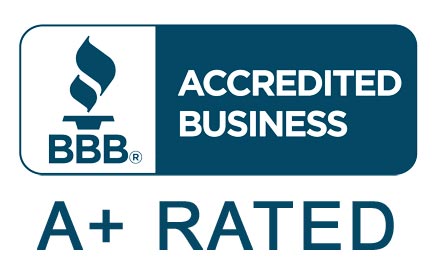For outdoor surfaces like patios, walkways, and driveways, popular material options are pavers vs. flagstone vs. concrete. Which is best? It depends.
Each material has its own unique characteristics, benefits, and drawbacks. Your choice of material will depend on your personal aesthetic preferences, what the surface will be used for, and your budget.
Pavers
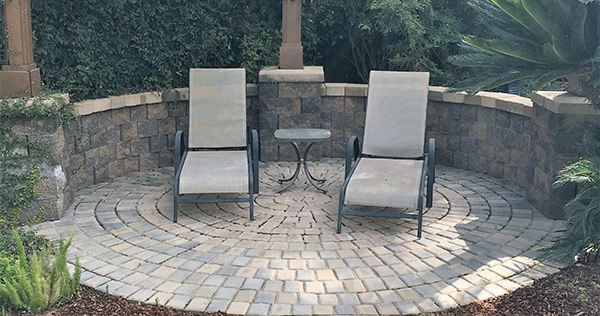
Pavers are versatile, and there are many design options available that allow you to customize the look of your installation. Here are some of the pros and cons to choosing pavers:
Pros to Choosing Pavers
- Aesthetic Variety. Pavers come in an extensive range of colors, shapes, and patterns. This allows for creative and customized designs, making it easy to match your outdoor space’s style.
- Easy Repair. If a single paver becomes damaged, it can be replaced without disrupting the entire surface. This makes maintenance relatively straightforward.
- Durability. Pavers are known for their strength and ability to withstand heavy loads. They are an excellent choice for driveways and high-traffic areas.
- Quick Installation. The installation of pavers is relatively fast and can be walked on immediately, making it a convenient choice for time-sensitive projects.
Cons to Choosing Pavers
- Weed Growth. The spaces between pavers can be susceptible to weed growth, requiring regular maintenance.
- Uneven Surface. Over time, pavers can shift and settle, creating an uneven surface that may require periodic leveling.
- Labor-Intensive Installation. The intricate designs and patterns of pavers may make the installation process more labor-intensive and time-consuming.
When to Choose Pavers
- You want a custom look. Pavers are perfect for homeowners who want a unique and intricate design for their outdoor space.
- Durability is required. If you need a robust and load-bearing surface for driveways or areas with heavy traffic, pavers are an ideal choice.
Flagstone
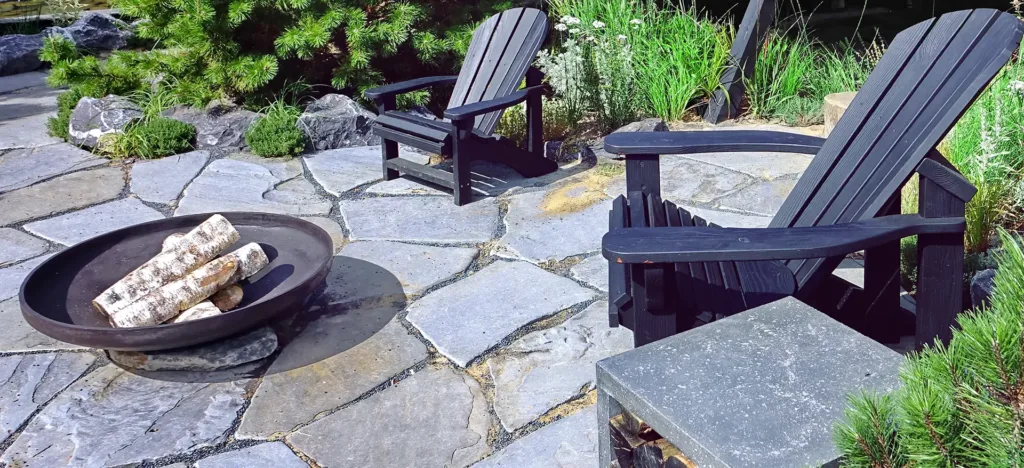
There’s a timeless, natural elegance to flagstone. Is it the right choice for you? Here are some pros and cons to consider:
Pros to Choosing Flagstone
- Natural Aesthetics. Flagstone’s unique, natural appearance lends a timeless and rustic charm to outdoor spaces. Its irregular shapes create an organic, appealing surface.
- Low Heat Retention. Flagstone remains cooler underfoot compared to concrete, making it an excellent choice for hot climates.
- Low Maintenance. Flagstone requires minimal maintenance, with occasional sealing to protect the surface and enhance its longevity.
- Environmentally Friendly. It is a natural material, making it a more eco-conscious choice.
Cons to Choosing Flagstone
- Irregular Shape. The irregular shapes and sizes of flagstone pieces can make installation more challenging and time-consuming.
- Lack of Uniformity. The unique and rustic appearance of flagstone may not appeal to those looking for a uniform and contemporary design.
- Slippery When Wet. Some types of flagstone can become slippery when wet, posing safety concerns.
When to Choose Flagstone
- The natural look appeals to you. If you’re aiming for a backyard with a classic and natural look, flagstone is an excellent choice.
- You have gentle slopes and curves in your landscape. Flagstone is flexible and can be adapted to uneven terrain, making it ideal for landscapes with slopes and curves.
- You’re looking for a cooling effect. In hot climates, flagstone’s natural ability to stay cool under the sun can provide comfort in outdoor living areas.
Concrete
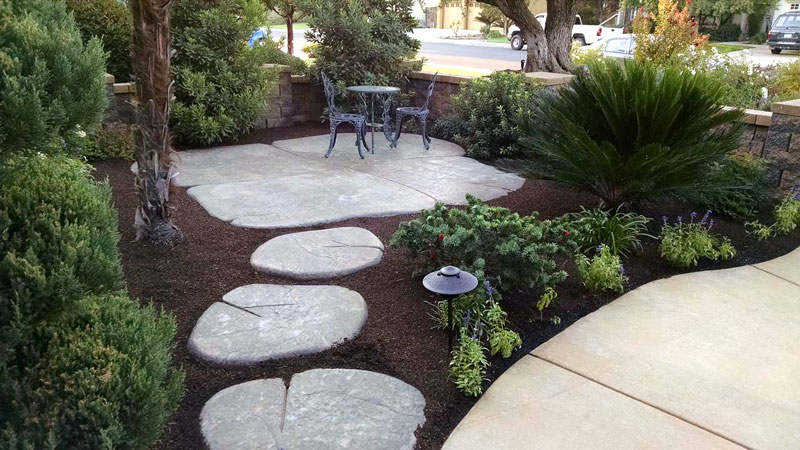
Concrete is a practical option, but that doesn’t mean it has to be boring. Here are some of the pros and cons to choosing concrete:
Pros to Choosing Concrete
- Affordability. Concrete is generally more budget-friendly compared to pavers and flagstone, making it an attractive choice for cost-conscious homeowners.
- Versatility. Concrete can be stamped, stained, or colored to mimic the appearance of more expensive materials. This allows for a wide range of design possibilities.
- Low Maintenance. Concrete is easy to clean and maintain, and sealing can extend its lifespan.
- Smooth Surface. If you require a smooth, uniform surface for furniture and activities, concrete offers a level platform.
Cons to Choosing Concrete
- Heat Retention. Concrete surfaces can become quite hot in direct sunlight, making them uncomfortable to walk on in periods of scorching temperatures.
- While concrete is durable, it can still develop cracks over time, which may require repair.
- Prone to Stains. Concrete can be susceptible to staining from spills and other substances if not properly sealed and maintained.
When to Choose Concrete
- You have some budget constraints. If you have a limited budget, concrete can offer a cost-effective solution without compromising on aesthetics.
- A uniform look appeals to you. For a uniform look, concrete is a versatile material that can be customized to your desired style.
- You want a low-maintenance option. If you prefer a surface that requires minimal upkeep, concrete is a practical choice.
Pavers vs. Flagstone vs. Concrete – Which is Best for You?
Each of these materials are excellent choices. Which is best for you depends on your specific needs, style preferences, and budget.
Consider your location, design goals, and maintenance expectations when making your decision. The experts at Mike’s Evergreen are here for you each step of the way. Read more about why choosing the right material matters here.
Let Mike’s Evergreen help you create an outdoor space that perfectly suits your lifestyle and aesthetic tastes. Contact us today for a consultation and to get started.
Have more questions about landscaping? Check out our Landscaping FAQ’s.
